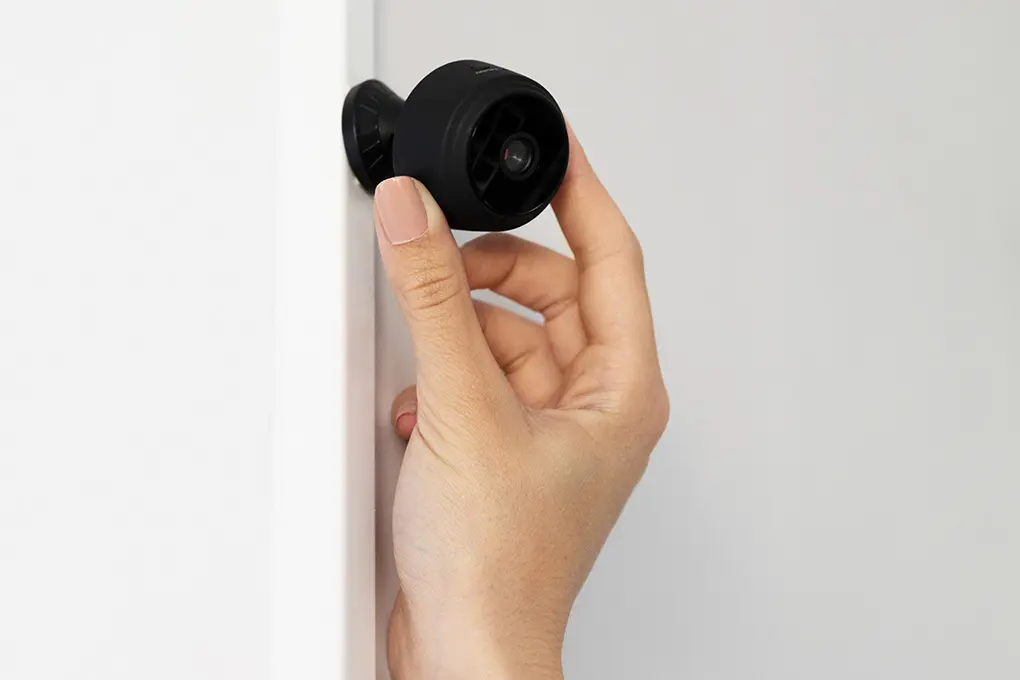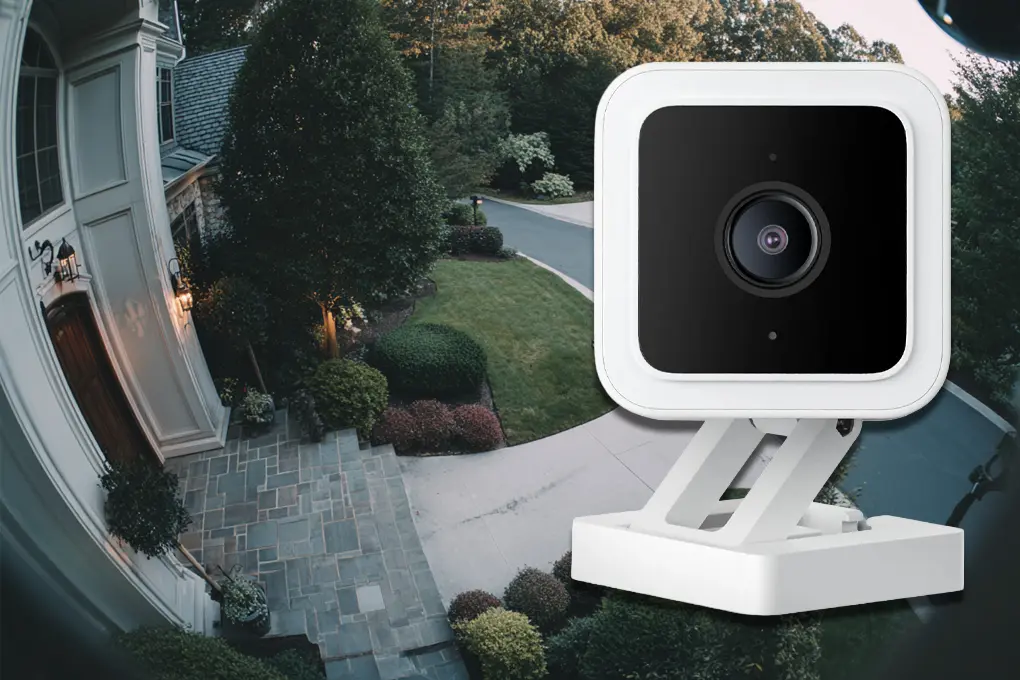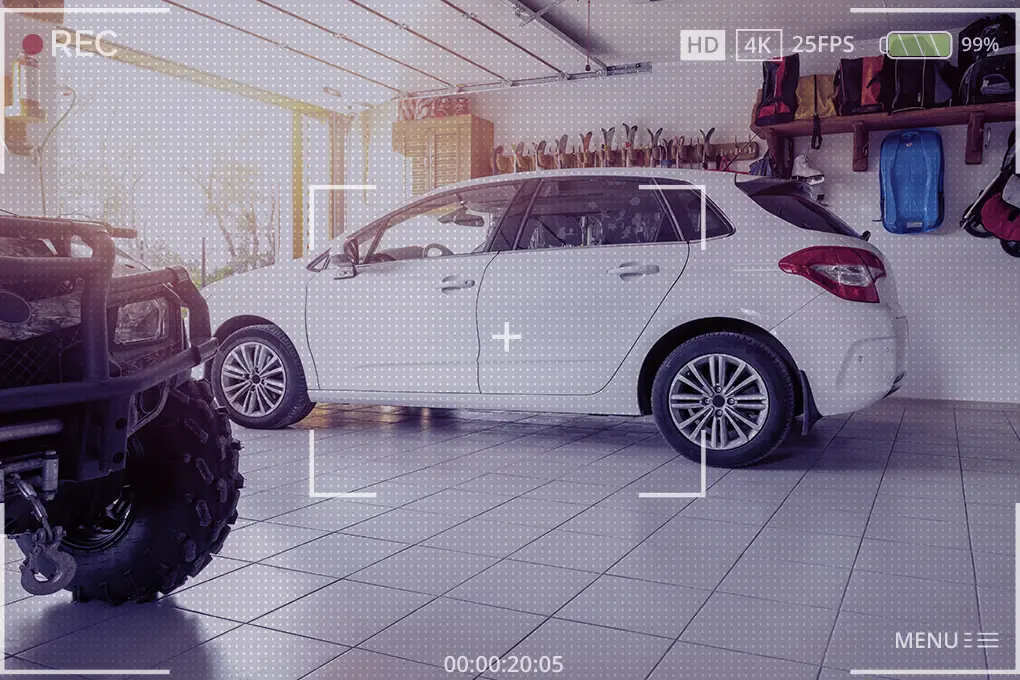Quick Answer: Hidden camera laws vary significantly by state, with some requiring all-party consent for recordings while others only need one-party consent, and violations can result in criminal charges ranging from misdemeanors to felonies. Before installing any surveillance equipment, check your state’s specific requirements and consider Batten Home Security’s legal surveillance solutions designed to protect your property while respecting privacy laws.
Table of Contents
- Key Takeaways
- Federal Law vs. State Law
- The Expectation of Privacy
- Signage Requirements: When You Must Post Warning Signs
- Complete State-by-State Hidden Camera Laws Reference
- Quick Reference Comparison Table
- Special Situations and Considerations
- Law Enforcement and Your Security Footage
- Workplace Surveillance: Employee Rights and Employer Obligations
- Legal Consequences and Penalties
- Best Practices for Legal Home Security
- Practical Scenarios and Examples
- Finding Hidden Cameras: Protection Tips
- State Law Enforcement Examples
- City and County Ordinances
- Data Retention and Storage Requirements
- Audio Recording vs. Video Recording: Critical Legal Differences
- School and Educational Facility Surveillance
- When to Consult an Attorney
- State-by-State Hidden Camera Laws
- Related Resources for Home Security
- Frequently Asked Questions
- Sources
The rise of affordable surveillance technology has made hidden cameras more accessible than ever – from nanny cams and doorbell cameras to tiny devices that can be concealed almost anywhere.
While these tools can protect your home and family, they also raise serious privacy concerns that vary dramatically across the United States. Knowing hidden camera laws in your state is essential to avoid devastating legal consequences that can include criminal charges, hefty fines, and prison time.
Many homeowners and renters assume they have the right to install any surveillance equipment on their property, but the reality is far more complex.
Federal law and state law differ when it comes to recording conversations, and states have their own specific security camera laws that can be stricter than federal guidelines. What’s perfectly legal in Texas might land you in serious legal trouble in California, and the difference often comes down to subtle distinctions in how each state defines privacy expectations and consent requirements.
Key Takeaways
- Hidden cameras are illegal in areas where people have a reasonable expectation of privacy (bathrooms, bedrooms, changing rooms) across all states
- Audio recording laws are stricter than video – 11 states require all-party consent while 38 states plus D.C. allow one-party consent
- Landlords can install cameras in common areas but never inside rental units without tenant consent
- Violations can result in felony charges, fines up to $10,000, prison time, and potential sex offender registration
- Batten Home Security offers legal surveillance solutions that comply with state and federal privacy laws
Federal Law vs. State Law
Before examining state-specific regulations, knowing the federal framework that governs surveillance across the country is crucial. Under federal law, individuals have a reasonable expectation of privacy in certain spaces such as homes, dressing rooms, and hotel rooms. The federal government sets a baseline through two primary laws that influence how states approach hidden camera legislation.
The Federal Wiretap Act, codified as 18 U.S.C. § 2511, primarily addresses audio recording rather than video surveillance. This law prohibits intentionally intercepting any wire, oral, or electronic communication, generally carrying up to five years of imprisonment.
That said, there’s an important exception: the law permits recording when one party to the communication has given prior consent, unless the recording is made for criminal purposes.
The Electronic Communications Privacy Act (ECPA) extends these protections to digital communications and provides the framework many states use when crafting their own surveillance laws.
According to video surveillance laws by state research, the ECPA governs audio recording and sets guidelines on how it can be integrated with video surveillance, distinguishing between one-party and all-party consent requirements.
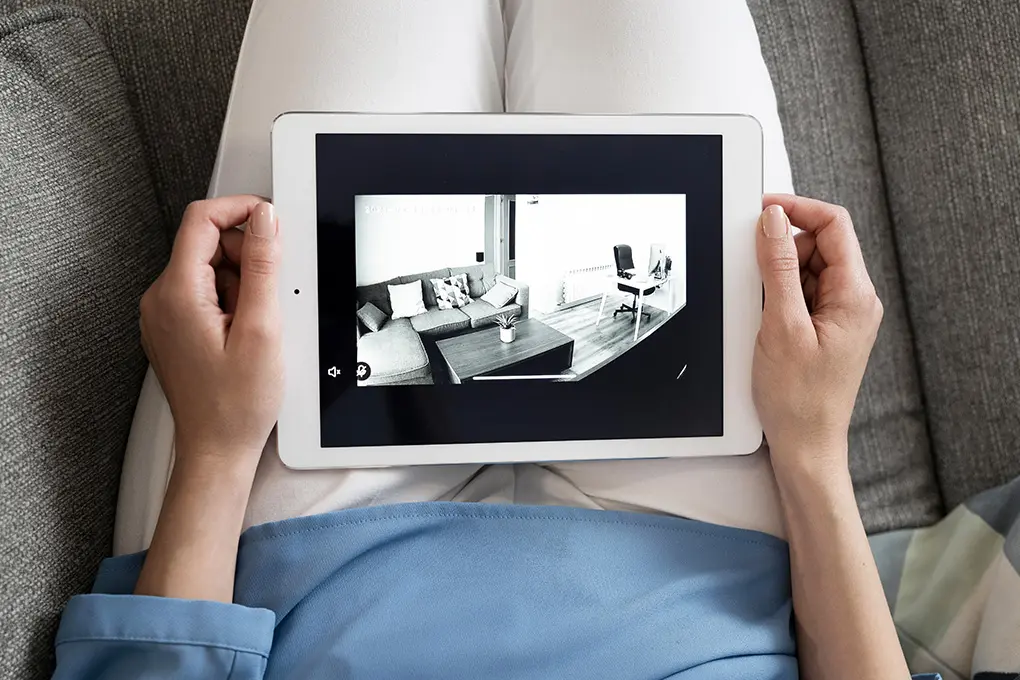
The Expectation of Privacy
At the heart of all hidden camera laws lies a fundamental legal principle: the reasonable expectation of privacy. This concept determines where you can and cannot place surveillance equipment, and misinterpreting it is where most people run into legal trouble.
Security camera placement laws interpret audio and video recording differently, with audio recording generally facing much stricter regulations across all states.
Areas where people have a reasonable expectation of privacy include:
- Bathrooms and restrooms
- Bedrooms and hotel rooms
- Changing rooms and fitting rooms
- Medical examination rooms
- Any space where someone might reasonably expect to disrobe
Public spaces generally don’t carry the same privacy expectations. This includes areas like your front yard, public sidewalks, retail stores, and office common areas.
That said, even in these spaces, the direction and focus of your cameras matter – a camera in your yard that happens to capture the street is different from one deliberately aimed at your neighbor’s bedroom window.
Ready to secure your property the right way? Check out Batten’s curated collection of legal home security cameras that respect privacy laws while protecting what matters most.
Signage Requirements: When You Must Post Warning Signs
Many states and localities require visible notification about surveillance cameras, especially in commercial settings. While federal law doesn’t mandate signage, posting clear warnings serves multiple purposes: it deters crime, demonstrates legal compliance, and helps avoid privacy disputes.
States with Specific Signage Requirements
- California and New York: Require conspicuous CCTV signs in commercial properties
- Florida: Mandates signs at monitored entry points
- Texas: May require operator contact details on signage
- Connecticut and Delaware: Businesses must notify employees and customers about cameras
Best Practices for Surveillance Signage
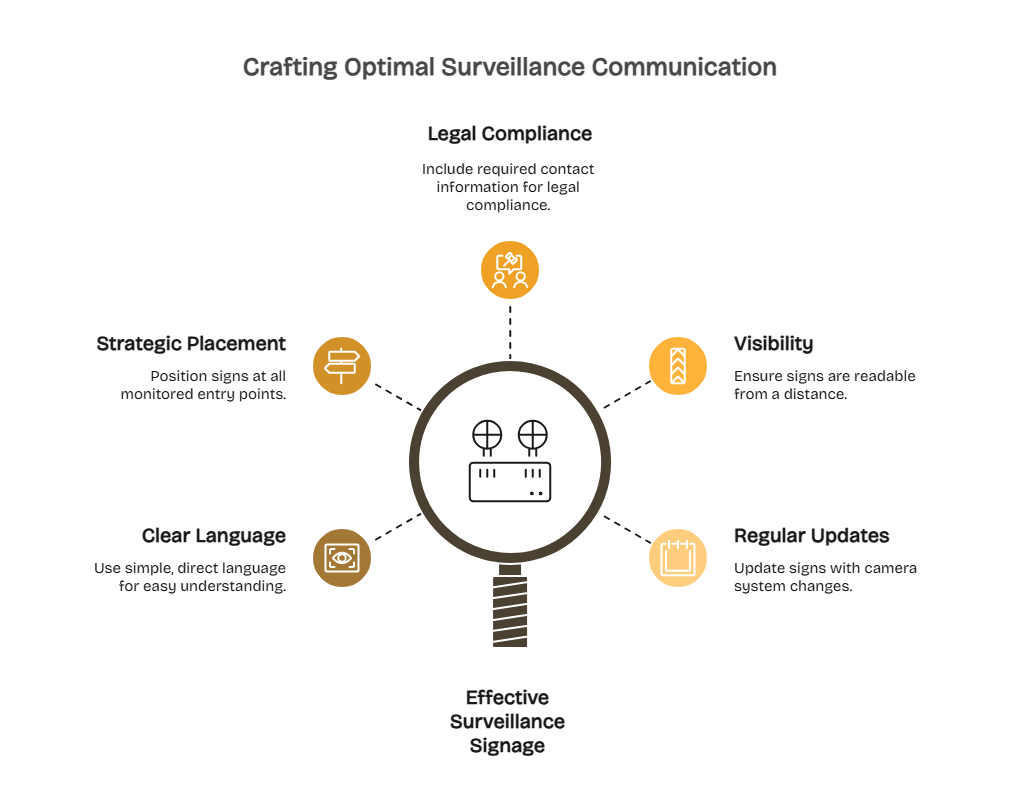
- Use clear language like “24-Hour Video Surveillance in Use”
- Place signs at all monitored entrances
- Include contact information when required by state law
- Make signs visible and readable from a reasonable distance
- Update signage when camera systems change
Not sure which security system fits your needs? Browse Batten’s home security marketplace for expert-vetted solutions with clear compliance guidelines.
Complete State-by-State Hidden Camera Laws Reference
Let’s take a look at the hidden camera laws for all states in the USA.
All-Party Consent States (11 states)
These states require everyone involved in a recording to consent:
California – Penal Code 647(j) prohibits hidden cameras in private areas. All-party consent required for audio. Up to 6 months jail, $1,000 fine (misdemeanor), increased for repeat offenses or minors.
Connecticut – Mixed consent state. One-party for in-person, all-party for phone calls. Businesses must notify about cameras in private areas.
Delaware – Hidden cameras prohibited without consent. All-party consent for audio recording. Clear disclosure requirements.
Florida – Statute 810.145 prohibits video voyeurism. All-party consent for audio. Felony charges possible, enhanced penalties for minors.
Illinois – Strict eavesdropping laws. All-party consent required for audio recording. Silent video recording permitted in public areas only.
Maryland – All-party consent for audio. Video permitted on private property without sound. Strict penalties for violations.
Massachusetts – All-party consent for any audio recording. Among the strictest surveillance laws nationally.
Montana – All parties must be notified of recording. Consent can be implied if notification given and parties continue.
Nevada – All-party consent for phone calls, one-party for in-person conversations. Complex dual requirement system.
New Hampshire – All-party consent required. Reasonable expectation of privacy strictly enforced.
Pennsylvania – Strict all-party consent for all oral communications. Hidden cameras in private spaces prohibited.
Washington – All-party consent required for private conversations. Clear penalties for violations.
One-Party Consent States (38 states + D.C.)
These states allow recording if one person in the conversation consents:
Alabama, Alaska, Arizona, Arkansas, Colorado, District of Columbia, Georgia, Hawaii, Idaho, Indiana, Iowa, Kansas, Kentucky, Louisiana, Maine, Michigan*, Minnesota, Mississippi, Missouri, Nebraska, New Jersey, New Mexico, New York, North Carolina, North Dakota, Ohio, Oklahoma, Oregon, Rhode Island, South Carolina, South Dakota, Tennessee, Texas, Utah, Vermont, Virginia, West Virginia, Wisconsin, Wyoming
*Michigan: Court ruling allows participants to record their own conversations despite all-party statute
U.S. Territories
Puerto Rico – Follows federal one-party consent rules
Guam – Federal one-party consent applies
U.S. Virgin Islands – Federal law governs, one-party consent
American Samoa – Federal one-party consent rules
Northern Mariana Islands – Federal guidelines apply
Quick Reference Comparison Table
| Aspect | One-Party Consent States | All-Party Consent States |
| Audio Recording | Legal if you’re part of conversation | All participants must consent |
| Hidden Video (No Audio) | Legal in public/common areas | Legal in public/common areas |
| Hidden Video (Private Areas) | Illegal without consent | Illegal without consent |
| Penalties | Typically misdemeanor | Often felony charges |
| Number of States | 38 + D.C. | 11 states |
Special Situations and Considerations
Some surveillance laws vary depending on where cameras are installed and who owns the property. One of the most common examples involves rental housing, which is covered under Landlord and Tenant Rights.
Landlord and Tenant Rights
In rental properties, landlords are generally allowed to install cameras in common areas such as hallways, parking lots, and entrances, provided they are visible and used for legitimate security purposes. They may also place cameras on exterior walls or other shared spaces if tenants are notified.
Landlords cannot install cameras inside rental units, aim them at tenant windows or balconies, or use hidden cameras anywhere on the property. Audio recording is restricted unless all parties consent, as required by federal and state wiretap laws.
Tenants can install cameras inside their own units, but they must avoid recording shared hallways, neighboring doors, or outdoor areas beyond their lease boundaries. Written permission is recommended for any permanent installations or wired devices.
Law Enforcement and Your Security Footage
Can police demand your security camera footage? The answer depends on the circumstances. Law enforcement generally needs a warrant to access your private surveillance footage, but there are exceptions:
When Police Can Access Your Footage
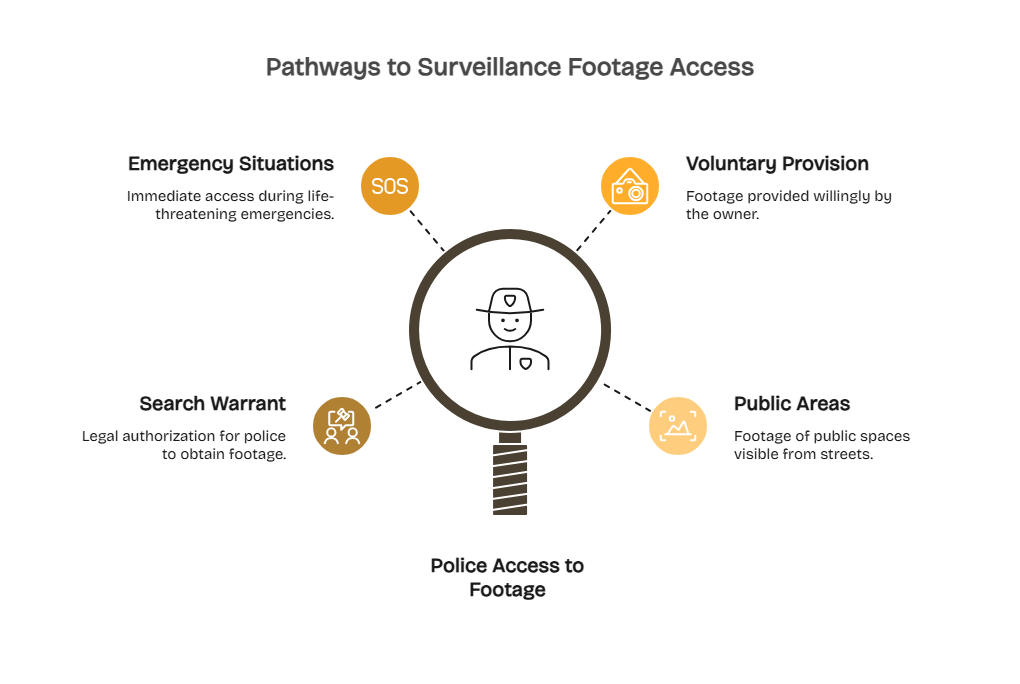
- With a valid search warrant
- During emergency situations involving immediate danger
- If you voluntarily provide the footage
- When cameras capture public areas visible from the street
Your Rights as a Camera Owner
- You can refuse to share footage without a warrant
- You’re not required to have cameras that law enforcement can access
- You can set retention policies for how long footage is stored
- You may be legally required to preserve footage if notified of pending litigation
For comprehensive protection that works with law enforcement when needed, see Batten’s professionally monitored security systems that balance privacy with safety.
Workplace Surveillance: Employee Rights and Employer Obligations
Workplace monitoring is permitted under federal law, but it comes with clear boundaries designed to protect employee privacy. Employers may install cameras in common work areas for security or productivity reasons, yet cameras are strictly prohibited in bathrooms, locker rooms, or other private spaces.
Recording during union organizing activities is also off-limits under federal labor protections. Many states require employers to notify staff before implementing video surveillance, especially when ongoing monitoring is involved.
Audio recording adds another layer of regulation, as most states require consent from one or all parties before sound can be captured. These combined rules aim to balance legitimate business interests with employee privacy rights.
Nanny Cams and Home Surveillance
Home surveillance, including the use of nanny cams, is legal in most states when used responsibly and placed in appropriate areas. Cameras may be installed in common living spaces such as kitchens or family rooms, where activity is visible and privacy expectations are limited.
Placing cameras in bathrooms or guest bedrooms is generally prohibited, as these areas are legally considered private. Even when not explicitly required, disclosing the presence of cameras to household employees or guests is strongly recommended. If a device includes audio recording, consent must be obtained in advance to comply with federal and state wiretap laws.
Legal Consequences and Penalties
Violating hidden camera laws carries serious consequences that vary by state and circumstance:
Criminal Penalties
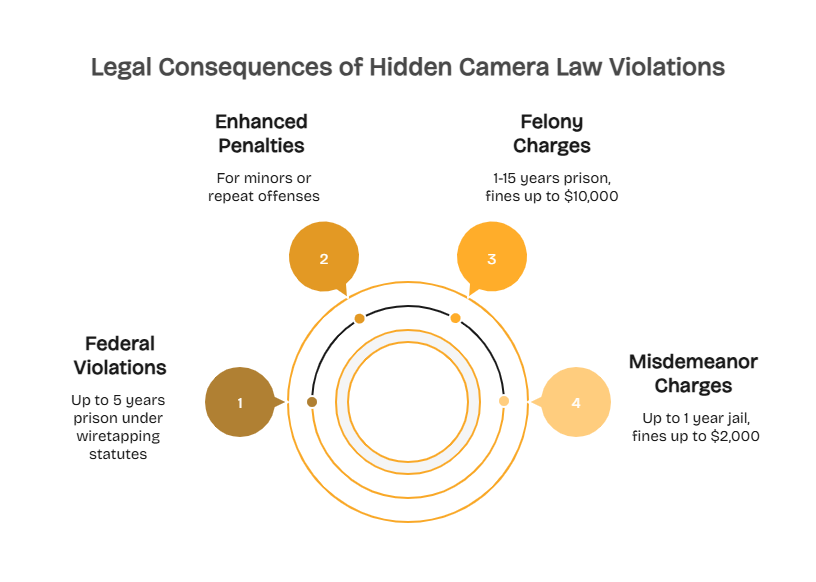
- Misdemeanor Charges: Up to 1 year jail, fines up to $2,000
- Felony Charges: 1-15 years prison, fines up to $10,000
- Enhanced Penalties: Recordings involving minors or repeat offenses
- Federal Violations: Up to 5 years prison under wiretapping statutes
Additional Consequences
- Civil lawsuits for invasion of privacy
- Sex offender registration (in certain cases)
- Professional license revocation
- Permanent criminal record
- Substantial monetary damages in civil court
Florida’s video voyeurism statute provides an example of strict enforcement, with third-degree felony charges for first offenses involving dissemination.
Best Practices for Legal Home Security
To keep your home surveillance system compliant while protecting your property, it is important to follow proper installation, documentation, and professional guidelines. Each step helps ensure that your setup provides security without violating privacy laws.
Installation Guidelines
Cameras should be positioned to monitor only your own property, avoiding any coverage of neighboring yards or windows. Audio recording should remain disabled unless you are certain that consent requirements are met under state law.
Visible cameras are generally preferable to hidden devices, as they promote transparency and reduce privacy disputes. Posting clear signs indicating that video surveillance is in use can also help demonstrate lawful intent and discourage trespassing.
Documentation Requirements
Maintaining thorough records is an important part of compliance. Keep a detailed list of camera locations and coverage zones, along with the dates of installation and any subsequent system changes. If consent is obtained from anyone being recorded, document this clearly. Saving all correspondence related to camera placement provides additional proof of good-faith effort to meet legal obligations.
Professional Recommendations
Working with licensed security professionals familiar with local surveillance laws is one of the most reliable ways to ensure compliance.
Experienced installers can identify ideal camera angles, advise on visibility requirements, and help balance strong security coverage with respect for privacy. This proactive approach reduces the likelihood of legal issues and helps maintain a safe, transparent home environment.
Practical Scenarios and Examples
Let’s go over some practical scenarios to give you a better idea of what you’re dealing with.
Scenario 1: Protecting Your Package Deliveries
You want to monitor your front porch for package thieves. Installing a video doorbell that records your porch and walkway is legal in all states. However, ensure it doesn’t capture detailed views of neighbors’ properties.
Scenario 2: Monitoring a Nanny
Placing cameras in your living room and kitchen to monitor childcare is generally legal. However, cameras in the nanny’s designated break area or bathroom are illegal everywhere. Informing the caregiver about cameras, while not always legally required, prevents disputes.
Scenario 3: Rental Property Security
A landlord wanting to prevent vandalism can install visible cameras in hallways and parking areas. That said, according to landlord surveillance guidelines, cameras cannot be hidden or pointed at unit entrances where they might capture tenants entering door codes.
Finding Hidden Cameras: Protection Tips
If you suspect illegal surveillance in your space:
Detection Methods
- Use a flashlight to check for lens reflections
- Scan Wi-Fi networks for unknown devices
- Inspect smoke detectors, clocks, and USB chargers
- Check for small holes in walls or objects
- Use RF detectors to find wireless cameras
If You Find Hidden Cameras
- Don’t touch or remove the device
- Document with photos and video
- Contact local law enforcement immediately
- Preserve the scene for investigation
- Consult an attorney about civil remedies
State Law Enforcement Examples
California’s invasion of privacy statute demonstrates strict enforcement, with prosecutors actively pursuing cases involving hidden cameras in private spaces. Recent cases have resulted in significant jail time and mandatory sex offender registration for violators.
Texas enforcement focuses on audio recording violations, with courts generally supporting property owners’ rights to video surveillance while strictly enforcing audio consent requirements.
City and County Ordinances
Beyond state laws, many cities and counties have their own surveillance regulations that can be even stricter. Currently, only 15 states have specific security camera laws, but hundreds of local jurisdictions have added their own requirements.
Examples of Local Regulations
- Prince George’s County, MD: Requires 1080p minimum resolution cameras in high-occupancy buildings with 30-day footage retention
- San Francisco, CA: Restricts government use of facial recognition technology
- Boston, MA: Requires permits for certain commercial surveillance installations
- New York City: Has specific regulations for residential building security cameras
Common Local Requirements Include
- Permit requirements for camera installation
- Specific retention periods for footage
- Resolution minimums for certain properties
- Registration of surveillance systems
- Restrictions on camera angles and coverage areas
Always check with your local city or county government before installing cameras. What’s legal at the state level might still violate local ordinances. Need help navigating local requirements? Batten’s security experts can guide you through compliance in your area.
Data Retention and Storage Requirements
Modern surveillance technology raises additional legal questions:
Smartphone Recordings
Using your phone to record in states with one-party consent laws is legal if you’re part of the conversation. However, secretly recording others’ conversations remains illegal everywhere.
Cloud Storage
Storing surveillance footage in cloud services doesn’t change legal requirements. You remain responsible for ensuring recordings comply with applicable laws.
Smart Home Integration
Devices that integrate with Alexa or Google Home must still comply with surveillance laws. Voice activation features may trigger audio recording restrictions.
Audio Recording vs. Video Recording: Critical Legal Differences
The distinction between audio and video recording creates one of the most common legal pitfalls for security camera owners. Many people don’t realize that adding audio to their cameras triggers entirely different legal requirements.
Key Differences
- Video Only: Generally legal in public areas and your own property
- Audio Recording: Subject to strict wiretapping laws
- Combined Audio/Video: Must comply with both sets of laws
Why Audio Is More Restricted
- Federal Wiretap Act treats audio as “communication interception”
- Conversations have higher privacy expectations than visual activities
- Audio can capture conversations beyond camera’s visual range
- Courts view audio recording as more invasive
Practical Impact by Location
- Your Front Door: Video doorbell can record video, but audio requires consent in all-party states
- Your Business: Can monitor employee activities visually, but recording conversations may be illegal
- Your Home Interior: Nanny cam video is legal, but audio features should be disabled without consent
Want cameras without the legal headaches? Check out Batten’s selection of video-only security cameras designed for maximum protection with minimal legal risk.
School and Educational Facility Surveillance
For comprehensive home protection that respects privacy laws, consider these Batten Home Security solutions:
- Outdoor security cameras designed for perimeter monitoring
- Smart alarm systems with legal compliance built-in
- Motion sensors that detect without recording
- Professional monitoring services that understand legal requirements
When to Consult an Attorney
Legal advice is strongly recommended before installing or expanding any surveillance system in situations that may raise privacy or compliance concerns. Consulting an attorney ensures you understand the limits of your local and state laws before recording begins.
You should seek legal guidance if you are a landlord planning to install cameras on rental property or if your business intends to monitor employees outside of common areas. Professional advice is also essential when surveillance is connected to gathering evidence for suspected crimes, divorce proceedings, or child custody disputes.
Other circumstances that warrant consultation include receiving complaints about existing cameras, uncertainty about local ordinances, or the need to meet industry-specific privacy standards such as those in healthcare or finance. If you plan to use facial recognition or AI-based monitoring, legal review becomes even more critical to avoid violations.
The cost of early legal guidance is minimal compared to the potential risk of criminal penalties or civil lawsuits. Protect your property and privacy the right way by choosing Batten’s legally compliant security solutions designed with privacy standards in mind.
State-by-State Hidden Camera Laws
Hidden camera laws differ widely across the United States, and misunderstanding them can lead to serious consequences. While video surveillance can help protect your home or business, it must always respect privacy expectations and consent requirements.
Before installing any device, confirm your state and local laws, ensure clear signage, and avoid recording private spaces. Audio surveillance carries stricter restrictions, so disable microphones unless you have verified consent.
For complete peace of mind, consider professional guidance and security systems designed for compliance. Batten Home Security offers legally compliant, privacy-conscious solutions that protect your property without crossing legal boundaries. Secure your space the right way – with confidence and clarity.
Related Resources for Home Security
Before setting up your surveillance system, take a look at these helpful guides from Batten Home Security:
- Indoor Camera Placement Guide: Learn optimal camera positions that maximize coverage while respecting privacy
- Security Cameras for Rental Properties: Special considerations for landlords and property managers
- Pet-Friendly Security Options: Monitor your furry friends without legal complications
- Securing Smart Home Devices: Protect your privacy while using connected cameras
- No-Contract Security Systems: Flexible options that don’t lock you into long-term monitoring
Frequently Asked Questions
Are Hidden Cameras Legal in Private Homes?
Yes, hidden cameras are legal inside your own home if they do not record areas where someone has a reasonable expectation of privacy, such as bathrooms or bedrooms. Audio recording, however, may require consent depending on your state.
Do I Need to Post a Sign for Video Surveillance?
While federal law does not require signs, several states and localities do. Even when not required, visible signage helps deter crime, informs visitors, and demonstrates a good-faith effort to comply with privacy laws.
Can I Record Audio and Video at the Same Time?
You can record both only if you meet your state’s consent requirements. Eleven states require all-party consent for audio, while others allow one-party consent. Video alone is typically less restricted but still limited by privacy expectations.
Is It Legal for Landlords to Use Security Cameras?
Landlords can place visible cameras in shared or common areas like hallways, entrances, or parking lots. Cameras inside rental units or pointed toward windows and doors are illegal without tenant consent.
What Happens If I Violate Hidden Camera Laws?
Penalties vary by state but can include misdemeanor or felony charges, fines up to $10,000, imprisonment, and even sex offender registration in severe cases. Violations may also lead to civil lawsuits for invasion of privacy.
Can Police Access My Security Footage Without Permission?
Generally, law enforcement needs a warrant to access private footage. Exceptions apply in emergencies or if you voluntarily share the footage. Always confirm requests are supported by legal documentation.
What Is the Safest Way to Stay Compliant?
Work with licensed installers familiar with your state’s laws, avoid recording private spaces, and disable audio unless you have verified consent. For legally sound home protection, consider Batten’s privacy-conscious security systems tailored to state and federal compliance.
Sources
- SafeWise – Security Camera Laws, Rights, and Rules 2025. Available at: https://www.safewise.com/security-camera-laws/
- Security.org – Legality of Security Camera Usage & Placement in 2025. Available at: https://www.security.org/security-cameras/legality/
- Get Safe and Sound – Video Surveillance Laws by State: Comprehensive Guide (2025). Available at: https://getsafeandsound.com/blog/video-surveillance-laws-by-state/
- Get Safe and Sound – Security Camera Placement Laws: Federal & State Guide (2025). Available at: https://getsafeandsound.com/blog/security-camera-placement-laws/
- Get Safe and Sound – Apartment Security Camera Laws for Tenants: Full Guide (2025). Available at: https://getsafeandsound.com/blog/apartment-security-camera-laws/
- Justia – Recording Phone Calls and Conversations – 50 State Survey. Available at: https://www.justia.com/50-state-surveys/recording-phone-calls-and-conversations/
- UpCounsel – Video Surveillance Laws by State. Available at: https://www.upcounsel.com/video-surveillance-laws-by-state
- Shouse Law Group – California Penal Code 647(j) PC – Invasion of Privacy. Available at: https://www.shouselaw.com/ca/defense/penal-code/647j/
- Florida Senate – Florida Statutes Section 810.145. Available at: https://www.flsenate.gov/Laws/Statutes/2018/810.145
- Musca Law – Overview of Florida Statute 810.145 Video Voyeurism. Available at: https://www.muscalaw.com/knowledge/an-overview-of-florida-statute-810145-video-voyeurism
- Los Angeles Criminal Lawyer – California Penal Code Section 647(j) PC Invasion of Privacy. Available at: https://www.losangelescriminallawyer.pro/california-penal-code-section-647-j-pc-invasion-of-privacy.html
- Texas State Law Library – Audio Recording Laws Guide. Available at: https://guides.sll.texas.gov/recording-laws/audio-recording
- Claap – Recording Conversations Legally: Your Guide to One-Party Consent States. Available at: https://www.claap.io/blog/one-party-consent-states
- Mobile Video Guard – Video Surveillance Laws By State. Available at: https://mobilevideoguard.com/video-surveillance-laws-by-state/
- Reolink – Laws on Outdoor Surveillance Cameras for Home: Legal Insights. Available at: https://reolink.com/blog/laws-on-outdoor-surveillance-cameras-for-home/
- PayRent – Security Cameras and Rental Properties: Landlord and Tenant Rights. Available at: https://www.payrent.com/articles/security-cameras-and-rental-properties-landlord-and-tenant-rights/
- Innago – Can Landlords Install Security Cameras?. Available at: https://innago.com/can-landlords-install-security-cameras/
- Get Safe and Sound – Security Camera Laws in Florida: Legal Considerations (2025). Available at: https://getsafeandsound.com/blog/security-camera-laws-in-florida/
- Electronic Communications Privacy Act of 1986 (ECPA), 1986 – Bureau of Justice Assistance. Available at: Ahttps://bja.ojp.gov/program/it/privacy-civil-liberties/authorities/statutes/1285ct of 1986 (ECPA) | Bureau of Justice Assistance
Legal Disclaimer: This article provides general information on hidden camera and surveillance laws as of 2025. Regulations vary by jurisdiction and change frequently. The content is not legal advice and should not be relied upon as such. Always consult a qualified attorney in your area for guidance on your specific situation. The authors and publishers disclaim any liability for the use or misuse of this information. While every effort is made to ensure accuracy, we cannot guarantee that all details remain current or complete. Using this information is at your own risk. Installing surveillance equipment without proper legal guidance may result in criminal charges or civil penalties. Always confirm the latest laws in your jurisdiction before using any recording devices.
